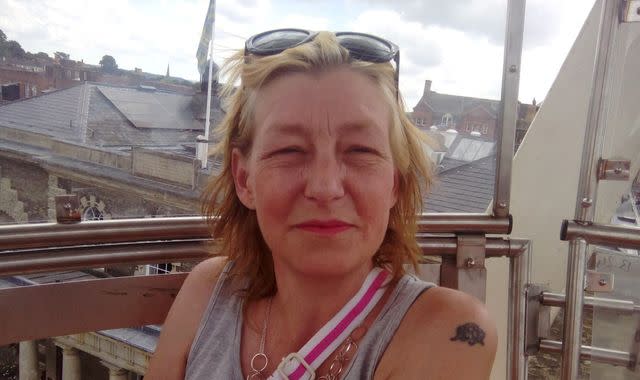Home secretary puts secrecy order on Salisbury inquiry

The home secretary has taken the "exceptional" step of imposing a secrecy order on the inquiry into the Salisbury poisonings, a hearing has been told.
Priti Patel, then the home secretary, signed a "restriction notice" on 27 July which prevents the inquiry sharing documents with the family of Dawn Sturgess - who was killed by Novichok in July 2018 - or making them public.
Ms Sturgess, 44, from Salisbury, Wiltshire, died after she was given a bottle of what appeared to be perfume by her partner, which actually contained a military-grade nerve agent.
She collapsed at the home of Charlie Rowley in Amesbury, Wilts and was taken to Salisbury District Hospital where she died on 8 July 2018, without regaining consciousness.
Read more: What is Novichok?
Her death followed the poisoning of Sergei Skripal, a Russian double agent, and his daughter Yulia, in Salisbury in March 2018, although both recovered after hospital treatment.
Two Russian GRU agents, using the names Alexander Petrov and Ruslan Boshirov, are charged with attempted murder, despite claiming on Russian TV that they were on a sightseeing tour to Salisbury Cathedral.
A third man, using the name Sergey Fedotov, who appears to have been the unit's commander, is also charged with attempted murder.
'Sensitive' material
A hearing at the Royal Courts of Justice, ahead of a public inquiry, was told that there is so much "sensitive" material to consider that a date for the hearings will not be set until next spring.
Andrew O'Connor KC, for the inquiry said that a restriction order would normally be made by the chairman in a "transparent" way, having heard submissions from "core participants".
"A restriction notice, by contrast, is essentially an instruction from a government minister made without consultation," he added, addressing the chairman.
"In most - some would say all - cases it ought to be you and not the secretary of state who takes the decision as to what evidence can be adduced in open proceedings, and what material must remain in closed."
However, he said that the restriction notice covers "only a small set of documents which represent an extremely small proportion of the total number of documents that have been provided, or are being provided, to the inquiry legal team by His Majesty's government."
It will not prevent the chairman from considering the material during closed hearings.
So far, only 40 documents of the 28,000 disclosed to the inquiry by the government and police have been passed to lawyers for the Sturgess family.
Government try to get names removed
The government had tried to get the names of all government employees below the rank of senior civil servant, removed from documents shared with the family, but the application was turned down by the chairman, Lord Hughes of Ombersley.
Cathryn McGahey KC for the government, said it was "hugely important that nothing is disclosed that helps a hostile state or terrorist to conduct another attack or to make it more deadly".
She said that the "greater proportion" of the documents so far disclosed to the inquiry would require restriction orders by the government, which means they cannot be disclosed to the public.
Ms McGahey told the hearing it was "important we don't raise false hopes or expectations" over how long a "sensitivity review" was likely to take.
"On any view, this is a slow process and takes considerable time and expertise to get it right," she added.

 Yahoo News
Yahoo News 
